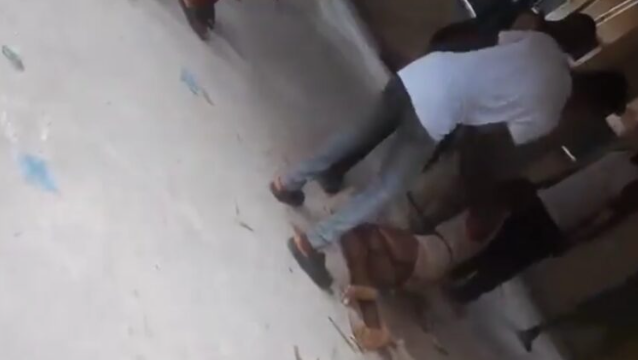
Shocking Tragedy in Imo: 22-Year-Old Man Tortured to Death Over Alleged Power Bank Theft

In a grim reflection of the brutality that still festers in pockets of Nigerian society, a 22-year-old man met a horrifying end in Owuelu Uratta, Owerri North Local Government Area of Imo State, after allegedly stealing a power bank. The young man, whose identity remains undisclosed at the time of reporting, was captured in a disturbing video that has sparked nationwide outrage and condemnation.
The now-viral footage, shared by an X (formerly Twitter) user @ChuksEricE, paints a harrowing picture. The young man is seen tied up against a wall, visibly weakened, as a man in a white shirt subjects him to a relentless and merciless beating. The victim’s pleas and apologies fall on deaf ears, as the assailant continues the assault without pause. According to online accounts accompanying the video, the victim succumbed to his injuries shortly after the beating.
This incident has unleashed a storm of fury on social media, where Nigerians have voiced collective anger and disbelief that such a trivial matter could escalate into a fatal mob action. The reaction is not only emotional but also reflective of a broader national frustration—one rooted in a perceived erosion of humanity, justice, and the value of life.
“This is not about a power bank,” one user commented. “It’s about the cruelty that has taken root in our society, where life has become so cheap that even an accusation—unproven—can turn neighbors into executioners.”
The video, which many have found too graphic to watch, has nonetheless become a rallying point for a country repeatedly stunned by extrajudicial acts of violence. While the man’s crime, if any, remains unconfirmed, his death has sparked calls for arrests and a thorough investigation.
One comment by @justsociety4all reads, “I am not watching ooo it will ruin the rest of my day for ordinary power bank. All that participated in that torturing must be thrown into jail.” This sentiment echoes across countless reactions, where users are demanding that justice not only be done but also be seen to be done.
Beyond the immediate tragedy, the incident has reignited discussions about mob justice, lawlessness, and the seeming impunity enjoyed by perpetrators of violence. Many Nigerians are asking the hard questions: Why does this continue to happen? Why are human rights so casually trampled upon in parts of the country? And what are the authorities doing to prevent these acts of collective violence?
In recent years, Nigeria has witnessed numerous instances where mobs have taken the law into their own hands. From accusations of petty theft to suspicions of witchcraft or even simple misunderstandings, too often the result is a public lynching—frequently filmed and circulated online as though it were entertainment. The normalization of such violence is perhaps the most chilling element of these tragedies.
This particular case also touches a raw nerve due to the nature of the object in question—a power bank. A small, inexpensive device used to charge phones has now been linked to a young man's death, highlighting both the economic desperation and the warped priorities that sometimes plague communities grappling with poverty, youth unemployment, and lack of social structure.
The victim, barely into adulthood, could have been anyone’s brother, friend, or neighbor. His death is more than just a statistic—it is a sobering reminder of the lives lost not just to crime, but to a society that too often fails to protect its own.
Some netizens have used this incident as an opportunity to highlight perceived tribal biases, with divisive and inflammatory comments making rounds. While this trend of ethnic scapegoating is not new, it detracts from the real issue at hand: the urgent need for legal reform, civic education, and stronger institutions.
Others point fingers at political leadership. “They would rather praise a corrupt politician and let him go scot-free instead,” wrote @Tobicods. “We deserve our leaders tbh.” This reflects a growing sentiment that the lack of accountability at the highest levels of governance is mirrored in everyday society, where people now mete out justice with sticks and fists instead of courts and law books.
Legal experts and human rights advocates are calling on the Imo State government and Nigerian Police Force to act swiftly. The individuals involved in the torture must be identified, arrested, and prosecuted to the full extent of the law. Anything less, they warn, would only embolden others to repeat such acts.
As of the time of this report, no official statement has been released by the Imo State Police Command, and no arrests have been confirmed. This silence is doing little to calm a restless public demanding immediate action.
Meanwhile, the family of the deceased is reportedly devastated. In a country where life is already tough, losing a young son under such brutal circumstances is a burden no family should bear. The hope, now, is that his death will not be in vain—that it will spark the kind of societal soul-searching and policy reform desperately needed to prevent another needless loss.
This is not just a story about a young man accused of stealing a power bank. It is a story about a country at a crossroads. A country that must decide whether to uphold justice or continue to watch it erode under the weight of impunity and mob rule.
Nigerians have seen enough blood spilled on the streets. From north to south, east to west, the message is loud and clear: no more. Let the death of this 22-year-old man serve as a turning point—a catalyst for justice, accountability, and the reaffirmation of the value of human life in Nigeria.


